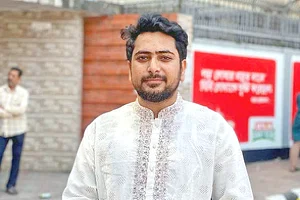Prothom Alo: Your movement led to the fall of the Awami League government, and you are now serving as advisors to the interim government. What are your plans moving forward?
Naheed Islam: The autocratic government was overthrown through a student and citizen uprising. Now, a new interim government has been formed, combining youth and experience. Our primary focus is to honor the promises that fueled this uprising—promises for which many sacrificed their lives, suffered injuries, and made significant sacrifices. We aim to establish a new Bangladesh and a fresh political framework where autocracy will not return, and where people’s security and justice are guaranteed. Our interim government will work towards these overarching goals, ensuring democracy and human rights.
Prothom Alo: What are the immediate priorities or actions for the interim government?
Naheed Islam: The interim government’s immediate priorities are to restore law and order and ensure public safety. The breakdown in law and order has eroded public trust, and addressing this issue is critical. Alongside necessary reforms or restructuring within the law enforcement agencies, we are prioritizing the treatment of injured students and working to restore the educational environment. Our goal is to refocus students on their studies and ensure that educational institutions are conducive to learning.
Prothom Alo: What is the anticipated duration of this government? What are your thoughts on this?
Naheed Islam: A key objective of the interim government is to establish a democratic framework and create a transparent process for transferring power. Bangladesh has long struggled with the absence of a constitutional process for power transfer, resulting in widespread disenfranchisement. The interim government will address these issues and implement necessary reforms. The duration of our term will be determined by the time required to finalize these processes in consultation with all relevant parties. Our primary goal is to transfer power to elected representatives as expeditiously as possible.
Prothom Alo: There is ongoing debate about banning student politics on campuses. What is your stance on this issue?
Naheed Islam: The trauma caused by the violent politics of student organizations cannot be overlooked. Incidents such as the murder of Abrar at BUET and the ongoing abuse of students at Dhaka University by these groups have had a lasting impact. Students have made significant sacrifices to pave the way for a better future. From this perspective, we must consider their concerns. Many students believe that campus politics driven by party affiliations and violence is unnecessary. Instead, they advocate for politics based on merit, knowledge, and the pursuit of their rights. Student politics should be centered around student unions rather than party agendas. Therefore, their demands are valid, and it is essential to engage with university teachers and other stakeholders to determine how universities should be managed.
Prothom Alo: You are now responsible for the Ministry of Posts, Telecommunications, and Information Technology. What steps will you take regarding controversial laws such as the Cyber Security Act and the Data Protection Act? Will you disclose the sources of software used for eavesdropping that infringed on personal security?
Naheed Islam: Information technology is a crucial area for state governance. During the recent movement, there was a digital crackdown involving internet shutdowns, which is now recognized as a human rights issue globally. Investigating these incidents is necessary. I will carefully review the criticisms associated with the Ministry of Posts, Telecommunications, and Information Technology and take prompt action to address them.










